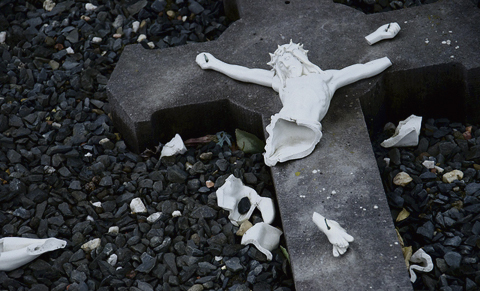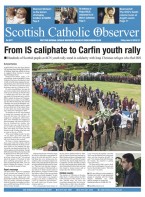April 15 | ![]() 0 COMMENTS
0 COMMENTS ![]() print
print

Hate has no place here
This week’s editorial leader
Following the Bishops of Scotland’s pre-election advice urging Catholics in Scotland not only to vote on May 5 but to also consider joining a political party to help ensure Catholic voices are heard, the heat is on for the Scottish elections.
The SCO this week raises concern over allegations that UKIP, with candidates on the list in Scotland, plans to inflame and play on fringe sectarian prejudice and fears to gain ground in Scotland—a truly despicable tactic. We are a democratic country but those who would trade on fear and ignorance have no place in that process.
Hugh McLoughlin this week explores the issues caused by Scottish party leaders indicating a willingness to make significant concessions to the tiny minority of gay and transgendered people in this country at great expense to Christian values and, in particular, to Catholic education. State-funded Catholic schools are enshrined and protected in the law of our land as one answer to, not the cause of, the aforementioned wound of sectarianism on our country. The image of a modern progressive Scotland we are being sold is marketed on the strength of its inclusiveness yet how can Scotland hail itself as inclusive when so-called progress comes at the cost of marginalising religion and the Faithfull? You cannot work on so-called equality by moving a tiny minority to centre-stage by forcing the Church into the excluded zone to do so.
Organised religion is not holding Scotland back. In truth, Faith groups helped build the foundations of our country and played a major role in getting us where we are today as a nation. Truth progress need both ‘gas’ and ‘brakes’—the push to move forward and the values and frame of reference to moderate the pace, value and direction of that progress. Minority interest groups come and go with trend, fad and fashion by our Church is universal through the ages.
While Pope Francis has summarised two synods and years of debate in his exhortation on the family Amoris Laetitia (The Joy of Love), it seems he has not silence all critics nor ended all controversy. Doctrinal progress or extended pastoral care? The debate remains between traditionalist and liberals, for many of whom a schism would be of as much academic interest as fear. Meanwhile, the bulks of Catholics will be able to get on with their lives knowing the mercy of Christ and the Church.
Church teaching has not changed on marriage and the family. Those who are living in irregular circumstances, however, are a welcome part of the parish community—a message that must be heard resounding loudly through the universal Church. Pope Francis has changed the tone of the debate on this issue for today and for all time.











